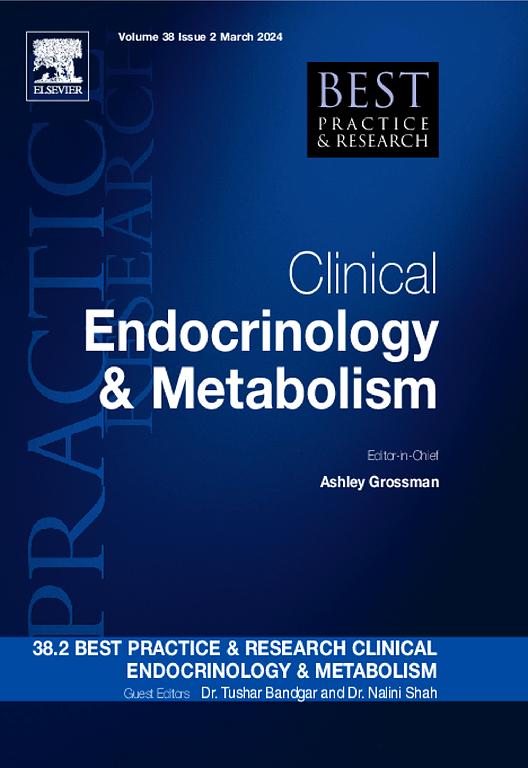Pituitary dysfunction due to sports injuries
IF 6.1
1区 医学
Q1 ENDOCRINOLOGY & METABOLISM
Best practice & research. Clinical endocrinology & metabolism
Pub Date : 2025-05-01
DOI:10.1016/j.beem.2025.101995
引用次数: 0
Abstract
Traumatic brain injury (TBI) during sports activities may lead to dysfunction of the pituitary gland. Even mild TBIs have been shown to have the potential to induce pituitary dysfunction. The clinical picture of pituitary dysfunction subsequent to TBIs may mimic the post-TBI period itself. Pituitary hormone deficiencies may improve or new ones may be observed over time. For this reason, hypopituitarism should be considered both during the acute phase and in the recovery period. The most prevalent pituitary hormone deficiency that follows a sports injury is growth hormone (GH) deficiency. Despite the established knowledge regarding the deleterious consequences of GH deficiency in the athletes, the efficacy of replacement therapy remains controversial. Concurrently, given the potential for GH to be utilised for doping purposes, a consensus on the monitoring of these patients remains elusive. There is a necessity for further systematic and large-scale studies on the epidemiology, pathophysiological mechanisms, screening algorithms, and prevention strategies related to sports-related pituitary dysfunction.
运动损伤所致垂体功能障碍。
体育运动中的创伤性脑损伤(TBI)可导致脑垂体功能障碍。即使是轻微的创伤性脑损伤也有可能诱发垂体功能障碍。脑外伤后垂体功能障碍的临床表现可能与脑外伤后时期相似。随着时间的推移,垂体激素缺陷可能会改善或出现新的缺陷。因此,在急性期和恢复期均应考虑垂体功能减退。运动损伤后最常见的垂体激素缺乏是生长激素(GH)缺乏。尽管关于运动员生长激素缺乏的有害后果的既定知识,替代疗法的有效性仍然存在争议。同时,鉴于生长激素有可能被用于兴奋剂目的,对这些患者的监测仍难以达成共识。对运动相关性垂体功能障碍的流行病学、病理生理机制、筛查算法和预防策略等方面进行系统、大规模的研究是必要的。
本文章由计算机程序翻译,如有差异,请以英文原文为准。
求助全文
约1分钟内获得全文
求助全文
来源期刊
CiteScore
11.90
自引率
0.00%
发文量
77
审稿时长
6-12 weeks
期刊介绍:
Best Practice & Research Clinical Endocrinology & Metabolism is a serial publication that integrates the latest original research findings into evidence-based review articles. These articles aim to address key clinical issues related to diagnosis, treatment, and patient management.
Each issue adopts a problem-oriented approach, focusing on key questions and clearly outlining what is known while identifying areas for future research. Practical management strategies are described to facilitate application to individual patients. The series targets physicians in practice or training.

 求助内容:
求助内容: 应助结果提醒方式:
应助结果提醒方式:


